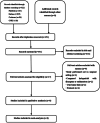The effect of haloperidol's perioperative application on postoperative delirium in elderly patients: a systematic review and meta-analysis
- PMID: 38308229
- PMCID: PMC10837937
- DOI: 10.1186/s12871-024-02434-8
The effect of haloperidol's perioperative application on postoperative delirium in elderly patients: a systematic review and meta-analysis
Abstract
Objectives: To systematically review the evidence about the effect of haloperidol on postoperative delirium in elderly patients.
Methods: PubMed, Embase, the Cochrane Library and China National Knowledge Infrastructure were used to find concerned studies for meta-analysis. The main outcome was the incidence of postoperative delirium, and the secondary outcomes were side effects of haloperidol and the length of hospital stay. The meta-analyses were conducted using the Review Manager Version 5.1. This study was conducted based on the PRISMA statement.
Results: Eight RCTs (1569 patients) were included in the meta-analysis. There was a significant difference in the incidence of postoperative delirium between haloperidol and control groups (OR = 0.62, 95%CI 0.48-0.80, P = 0.0002, I2 = 20%). In addition, side effects of haloperidol and the duration of hospitalization were comparable (OR = 0.58, 95%CI 0.25-1.35, P = 0.21, I2 = 0%; MD =-0.01, 95%CI -0.16-0.15, P = 0.92, I2 = 28%). Subgroup analysis implied the effect of haloperidol on postoperative delirium might vary with the dose (5 mg daily: OR = 0.40, 95%CI 0.22-0.71, P = 0.002, I2 = 0%; <5 mg daily: OR = 0.72, 95%CI 0.42-1.23, P = 0.23, I2 = 0%).
Conclusions: The meta-analysis revealed perioperative application of haloperidol could decrease the occurrence of postoperative delirium without obvious side effects in elderly people, and high-dose haloperidol (5 mg daily) possessed a greater positive effect.
Keywords: Haloperidol; Meta-analysis; Perioperative period; Postoperative delirium.
© 2024. The Author(s).
Conflict of interest statement
The authors declare no competing interests.
Figures








Similar articles
-
Effectiveness of haloperidol prophylaxis in critically ill patients with a high risk of delirium: a systematic review.JBI Database System Rev Implement Rep. 2017 May;15(5):1440-1472. doi: 10.11124/JBISRIR-2017-003391. JBI Database System Rev Implement Rep. 2017. PMID: 28498176
-
Non-pharmacological interventions for preventing delirium in hospitalised non-ICU patients.Cochrane Database Syst Rev. 2021 Jul 19;7(7):CD013307. doi: 10.1002/14651858.CD013307.pub2. Cochrane Database Syst Rev. 2021. PMID: 34280303 Free PMC article.
-
Drugs for preventing postoperative nausea and vomiting in adults after general anaesthesia: a network meta-analysis.Cochrane Database Syst Rev. 2020 Oct 19;10(10):CD012859. doi: 10.1002/14651858.CD012859.pub2. Cochrane Database Syst Rev. 2020. PMID: 33075160 Free PMC article.
-
Sertindole for schizophrenia.Cochrane Database Syst Rev. 2005 Jul 20;2005(3):CD001715. doi: 10.1002/14651858.CD001715.pub2. Cochrane Database Syst Rev. 2005. PMID: 16034864 Free PMC article.
-
Effects of Haloperidol on Delirium in Adult Patients: A Systematic Review and Meta-Analysis.Med Princ Pract. 2018;27(3):250-259. doi: 10.1159/000488243. Epub 2018 Mar 8. Med Princ Pract. 2018. PMID: 29518791 Free PMC article.
Cited by
-
Factors associated with satisfaction with oral sedation during ophthalmic surgeries.Graefes Arch Clin Exp Ophthalmol. 2025 Jun;263(6):1565-1572. doi: 10.1007/s00417-025-06781-1. Epub 2025 Mar 18. Graefes Arch Clin Exp Ophthalmol. 2025. PMID: 40102221 Clinical Trial.
-
Efficacy and safety of esketamine in preventing perioperative neurocognitive disorders: a meta-analysis of randomized controlled studies.Syst Rev. 2025 Mar 22;14(1):68. doi: 10.1186/s13643-025-02807-1. Syst Rev. 2025. PMID: 40121475 Free PMC article.
References
Publication types
MeSH terms
Substances
Grants and funding
LinkOut - more resources
Full Text Sources
Medical

